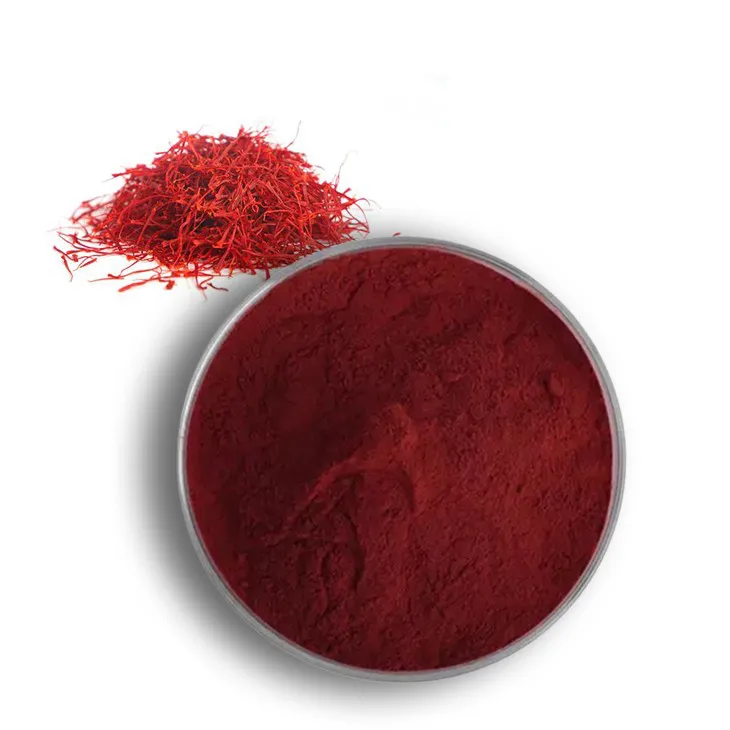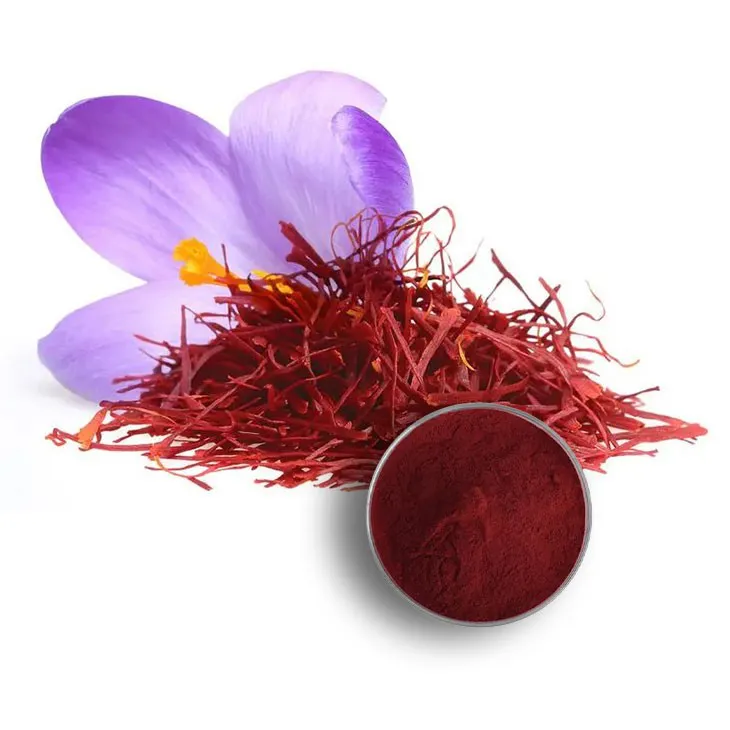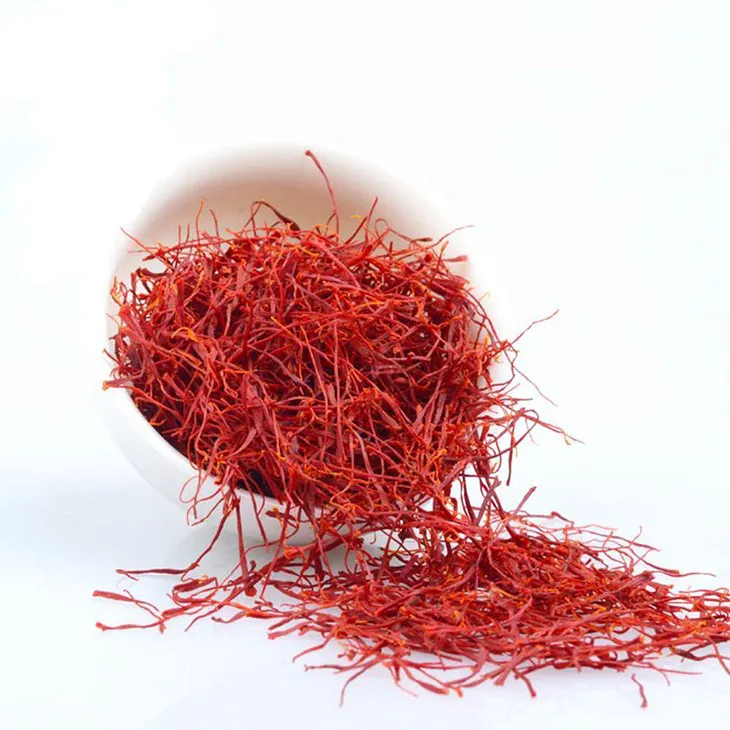- 0086-571-85302990
- sales@greenskybio.com
Saffron extract powder can reduce high blood pressure.
2024-11-12

1. Introduction
Hypertension, or high blood pressure, is a prevalent health issue that affects a significant portion of the global population. It is often referred to as the "silent killer" as it may not present noticeable symptoms in its early stages but can lead to serious complications such as heart disease, stroke, and kidney problems. In the search for natural remedies to combat hypertension, Saffron Extract Powder has emerged as a potential candidate. Saffron, derived from the Crocus sativus flower, has been used for centuries in traditional medicine for various purposes. This article will explore the properties of Saffron Extract Powder and its possible role in reducing high blood pressure.

2. The Composition of Saffron Extract Powder
Saffron extract powder contains a variety of bioactive compounds that may contribute to its potential health benefits. One of the main components is crocin, which is responsible for the characteristic color of saffron. Crocin has been shown to possess antioxidant properties. Antioxidants play a crucial role in the body by neutralizing free radicals, which are unstable molecules that can cause damage to cells and tissues. Another important compound in saffron extract powder is picrocrocin, which gives saffron its bitter taste. Additionally, safranal is present, and it is responsible for the unique aroma of saffron. These compounds work together in a complex manner, and it is hypothesized that they may interact with the body's physiological mechanisms to influence blood pressure.

3. Mechanisms by Which Saffron Extract Powder May Affect Blood Pressure
3.1 Vasodilation
One possible mechanism through which saffron extract powder could reduce high blood pressure is by promoting vasodilation. Vasodilation refers to the widening of blood vessels. When blood vessels dilate, the resistance to blood flow decreases, which in turn can lead to a reduction in blood pressure. Some studies suggest that the bioactive compounds in saffron extract powder may act on the smooth muscle cells in the blood vessel walls. For example, they may stimulate the release of nitric oxide, a molecule that is well - known for its vasodilatory effects. Nitric oxide relaxes the smooth muscle cells, causing the blood vessels to expand.
3.2 Anti - inflammatory Effects
Chronic inflammation has been associated with hypertension. Saffron extract powder may have anti - inflammatory properties due to its antioxidant components. By reducing inflammation in the body, it may help to improve the function of the blood vessels and the overall cardiovascular system. Inflammatory processes can damage the endothelial cells that line the blood vessels. When these cells are damaged, they can release substances that promote vasoconstriction (narrowing of blood vessels) and increase blood pressure. Saffron extract powder, through its anti - inflammatory effects, may help to protect the endothelial cells and maintain normal blood vessel function.
3.3 Regulation of the Renin - Angiotensin - Aldosterone System (RAAS)
The renin - angiotensin - aldosterone system (RAAS) plays a key role in blood pressure regulation. Renin is an enzyme that is released by the kidneys in response to low blood pressure or low blood volume. Renin then converts angiotensinogen to angiotensin I, which is further converted to angiotensin II. Angiotensin II is a potent vasoconstrictor and also stimulates the release of aldosterone, a hormone that promotes sodium and water retention, thereby increasing blood volume and blood pressure. Some research indicates that saffron extract powder may be able to interfere with the RAAS. It may inhibit the activity of renin or block the actions of angiotensin II, leading to a reduction in blood pressure.

4. Evidence from Studies
4.1 Animal Studies
Several animal studies have been conducted to investigate the effects of saffron extract powder on blood pressure. In one study, rats with induced hypertension were treated with saffron extract powder. The results showed that the blood pressure of the treated rats was significantly lower compared to the control group. The researchers observed that there were changes in the levels of certain biomarkers related to blood pressure regulation, such as nitric oxide and angiotensin - converting enzyme. Another animal study focused on the effects of saffron extract powder on the blood vessels of hypertensive mice. The study found that the extract improved the endothelial function of the blood vessels, which is an important factor in blood pressure control.
4.2 Human Studies
There have also been some human studies on the use of saffron extract powder for hypertension. However, the number of human studies is relatively limited compared to animal studies. In a small - scale clinical trial, participants with mild to moderate hypertension were given saffron extract powder for a certain period. The study reported a modest decrease in blood pressure in the participants who took the extract. However, more large - scale and long - term human studies are needed to confirm these findings. Some of the challenges in conducting human studies include the difficulty in standardizing the dosage of saffron extract powder, as well as potential confounding factors such as diet and lifestyle differences among the participants.
5. Considerations for Using Saffron Extract Powder
5.1 Dosage
Determining the appropriate dosage of saffron extract powder is crucial. Since there is no well - established standard dosage for its use in reducing blood pressure, it is important to be cautious. In some studies, different dosages have been used, and the effects may vary depending on the dosage. Taking too much saffron extract powder may lead to potential side effects, while taking too little may not produce the desired blood pressure - lowering effect.
5.2 Side Effects
Although saffron is generally considered safe when used in moderation, there can be some side effects associated with saffron extract powder. Some people may experience allergic reactions to saffron, which can range from mild skin rashes to more severe respiratory problems. Additionally, high doses of saffron extract powder may cause gastrointestinal issues such as nausea, vomiting, and diarrhea. Pregnant women should also be cautious when using saffron extract powder, as there is some evidence that it may have effects on the fetus.
5.3 Interaction with Medications
If you are currently taking medications for hypertension or other health conditions, it is important to consult your doctor before using saffron extract powder. Saffron may interact with certain medications, such as blood - thinning drugs. For example, it may increase the risk of bleeding if taken in combination with anticoagulant medications. Also, medications that affect blood pressure regulation, such as beta - blockers or ACE inhibitors, may interact with saffron extract powder, and the combined effects need to be carefully monitored.
6. Conclusion
In conclusion, saffron extract powder shows potential as a natural remedy for reducing high blood pressure. Its bioactive compounds may act through various mechanisms such as vasodilation, anti - inflammatory effects, and regulation of the RAAS. While animal studies have provided some promising results, more human studies are needed to fully understand its efficacy and safety. When considering using saffron extract powder for hypertension, it is important to take into account factors such as dosage, potential side effects, and possible interactions with medications. With further research, saffron extract powder may become a more recognized and widely used option in the management of hypertension.
FAQ:
What is saffron extract powder?
Saffron extract powder is derived from the saffron plant (Crocus sativus). It contains various bioactive compounds such as crocetin, crocin, and safranal. These compounds are believed to be responsible for many of its potential health benefits.
How might saffron extract powder reduce high blood pressure?
The bioactive compounds in saffron extract powder may have vasodilatory effects. By relaxing the blood vessels, it can potentially lower blood pressure. Additionally, it may also have antioxidant and anti - inflammatory properties that can contribute to better cardiovascular health and in turn help in reducing high blood pressure.
Is there any scientific evidence to support the claim that saffron extract powder can reduce high blood pressure?
There are some studies that suggest a potential link between saffron extract and blood pressure reduction. However, more research is needed for conclusive evidence. Some initial studies in animals and small - scale human trials have shown promising results regarding its effect on blood pressure regulation.
Are there any side effects associated with using saffron extract powder for blood pressure control?
When used in moderation, saffron extract powder is generally considered safe. However, in high doses, it may cause side effects such as nausea, dizziness, and dry mouth. Pregnant women should also avoid using saffron extract powder as it may have potential risks to the fetus.
How should saffron extract powder be taken for potential blood pressure reduction?
The appropriate dosage and method of taking saffron extract powder for blood pressure reduction have not been firmly established. It is best to consult a healthcare provider before starting any supplementation. Generally, it may be taken as a dietary supplement, but the dosage and frequency should be determined based on individual health status and other factors.
Related literature
- The Effects of Saffron on Blood Pressure: A Systematic Review"
- "Saffron Extract and Cardiovascular Health: An Overview"
- "Potential Role of Saffron in Hypertension Management"
- ▶ Hesperidin
- ▶ citrus bioflavonoids
- ▶ plant extract
- ▶ lycopene
- ▶ Diosmin
- ▶ Grape seed extract
- ▶ Sea buckthorn Juice Powder
- ▶ Beetroot powder
- ▶ Hops Extract
- ▶ Artichoke Extract
- ▶ Reishi mushroom extract
- ▶ Astaxanthin
- ▶ Green Tea Extract
- ▶ Curcumin Extract
- ▶ Horse Chestnut Extract
- ▶ Other Problems
- ▶ Boswellia Serrata Extract
- ▶ Resveratrol Extract
- ▶ Marigold Extract
- ▶ Grape Leaf Extract
- ▶ blog3
- ▶ blog4
- ▶ blog5
-
Organic Tongkat Ali extract powder factory.
2024-11-12
-
How to make powder with ashwagandha extract.
2024-11-12
-
Rosehip extract manufacturers from China.
2024-11-12
-
The best cat's claw extract in nature.
2024-11-12
-
Chinese Dandelion Leaf Extract Suppliers.
2024-11-12
-
Saw Palmetto Extract
2024-11-12
-
Kelp Extract Powder
2024-11-12
-
Buckthorn bark extract
2024-11-12
-
Black Rice Extract
2024-11-12
-
Astaxanthin
2024-11-12
-
Licorice Root Extract Powder
2024-11-12
-
Mulberry Extract
2024-11-12
-
Maitake Mushroom Extract
2024-11-12
-
Motherwort Extract
2024-11-12
-
Lycopene
2024-11-12





















